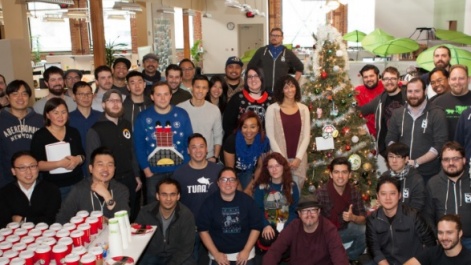It takes a great number of individuals working together in various disciplines to make any commercial enterprise function.
The mobile games industry is certainly no exception, offering dynamic and diverse roles to thousands the world over.
As such, PocketGamer.biz has decided to celebrate this with a regular series of interviews where each week we chat to a mobile games industry professional from a different field - be it game design, art, or PR - to learn about how they bagged that job in games.
Obviously every career path is different, but the goal is to give a picture of the sorts of skills, qualifications and ambition one might need to find themselves in such a role - and how we can all learn from it.
This time, the spotlight is on Devon Kim, Head of Technology at Nexon M.
PocketGamer.biz: Tell us a little about your current role and what it entails.
Devon Kim: I oversee the technology teams at Nexon M. We run the mobile business in the West for Nexon.
We were established a few years ago and we've had a tremendous start growing the company.
We’ve released, added to and are supporting a number of titles such as DomiNations, HIT: Heroes of Incredible Tales, Evil Factory and Oz: Broken Kingdom.
This past year has been incredible as we've been able to get featuring, best-in-class game recognition and keynote stage time with platform partners.
We provide a number of services to ensure operational success.Devon Kim
Our lineup for the coming year is looking phenomenal as we are releasing an exciting slate of titles which include After the End, Dynasty Warriors and Titanfall, to name a few.
We provide a number of services to ensure operational success of our games.
Our technology teams are spread across two divisions comprised of game and data development, and we see ourselves as the connective tissue to all parts of the tech stack; inclusive of game architecture, infrastructure management, and analytics.
To manage all that successfully, we have a talented group of engineering leads.
Being a Lead Engineer, Architect, Manager or Director can be challenging and extremely rewarding.
What differentiates good to great leaders depends on their ability to connect at a technical, business and personal level.
While engineers are capable of coming up with performant algorithms, expanding one’s repertoire to manage a collective group of individuals, features and deadlines can be taxing for anyone.
To be a successful Engineering Lead at Nexon, we expect that individual to take on multiple roles.
We categorise these with seven hats: Tech Owner, Mentor, Quality Ensurer, Planner, Deliverable Ensurer, Business Partner and Cultivator.

That’s a lot of hats. All are meaningful, and one shouldn’t be underscored. Each role has a distinct purpose throughout or at various parts of team software development.
We believe these roles form the foundation to own and nurture a team’s growth, culture and body of work.
It’s a challenge to stay in tune in with all areas, but identifying gaps and staying cognizant of these roles is our strategy for long-term success.
How does one get into engineering management?
Demonstrate professionalism, drive and reliability in your current role.
Learn by observation. Be perceptive, mindful and self-aware of the multiple roles as engineering has a specific set of needs and demands.
You don’t always have to agree with direction, but you need to express positivity and confidence.Devon Kim
Get the opportunity on your current team by expressing interest. Start off with earning a Lead Engineer role.
When getting these opportunities, it’s important to stay flexible and align with your managers. You don’t always have to agree with direction, but you need to express positivity, confidence and alignment to build trust.
Without it, you’ll be fluttering or going the opposite direction.
Be proactive and take control of your career as you will initially have the most to gain. If you aren’t getting the opportunity, look for alternative outlets to grow your experience.
Do a skill/gap analysis on yourself and get feedback from your peers and managers. Volunteer for leadership roles outside of work and get some practical experience under your belt.
What’s appealing about the role?
Two things come to mind: impact and growth.
As an engineer, influencing product decisions and technical design can be challenging.
If you’ve ever grown frustrated with the outcome of projects and direction, and wanted a larger footprint and impact on a product, team, process, or company, then this is for you.
Being in a role like this definitely puts you into the discussion.
Engineering leadership is humbling and very challenging, and that is exciting.
One can’t be the resident expert on all technologies so you are constantly challenged with being on top of the best ways to design and build software.
You’ll also be doing this with less control while trusting staff and peers.
You will continue to grow technically while experiencing new ways to solve problems through a non-programmatic lens, where efficiencies are the deliverables and your developers' varied skillsets and dispositions are the tools for execution.
What are some expectations around being an Engineering Lead?
There will be a different set of expectations as one climbs the proverbial ladder.
As a Lead Engineer or Manager, one is expected to be more tactical and keep the day-to-day humming through technical design vetting, code reviews, and pipeline planning/execution.
Establishing a positive environment surrounding best practices is critical.Devon Kim
Establishing a positive environment surrounding best practices is critical.
With further advancement, a senior leader is expected to perform the aforementioned responsibilities with more strategising - potentially with more teams.
If operational efficiencies are established for the organisation, it becomes less tactical and more about driving growth and culture.
Efficiencies and culture are integral parts of the process, but they all amount to delivering results. At the end of the day, all engineering leads will be measured against shipping quality software.
If we can’t do that, we have no value.
Is there anything about the job/industry you wish you would have known when first joining?
You can challenge and be vocal, even when you’re starting out (in a respectful, professional way, of course!). Question everything and seek out and supply answers.
Some common misperceptions with being an Engineering Lead is it gives you absolute authority. Nope. It isn't about being able to do things your way, all the time.
It’s about maturation as a professional, and bringing out the best in everyone. I tell teams that I constantly adapt to them and expect the same.
What other advice do you have for someone looking for a job in this profession?
A typical path is to focus on being a great developer.
Having the foundation and confidence to build any type of system or product will prove invaluable as you embark on that trek.
In our world of startups and fast-moving business, it’s easy to get promoted prematurely.Devon Kim
Once you have the experience building software, invest in understanding and aligning with your business cohorts. Be acutely aware of how every software decision impacts them.
Try not to skip steps and go through the ranks. In our world of startups and fast-moving business, it’s easy to get promoted prematurely.
Think twice if that’s presented to you, and be okay with its outcome. It can be a good move, just be aware of the realistic outcomes - there isn’t always a high possibility of success based on how things are dealt.
If it doesn’t work out, be honest about why it didn’t and be proactive for the next go-around. Stay confident, as you were given those opportunities for a reason.
Lastly, build up your emotional intelligence.
Nexon M is currently hiring. You can see all vacancies here.






















